
Category: Arvada Colorado Family Law Mediation
Arvada Colorado Family Law Mediation: Navigating Family Disputes with Harmony
Introduction
In the intricate realm of family law, mediation emerges as a powerful tool for resolving conflicts amicably. This article delves into the specifics of Arvada Colorado Family Law Mediation, exploring its role, benefits, and impact on families navigating complex legal issues. By examining its historical evolution, global reach, and local implementation, we aim to provide a comprehensive understanding of this alternative dispute resolution (ADR) method. Readers will gain insights into how mediation can foster harmony within families, offering a practical approach to managing disputes with sensitivity and efficiency.
Understanding Arvada Colorado Family Law Mediation
Definition and Core Components
Arvada Colorado Family Law Mediation is a voluntary process where a neutral third-party mediator assists disputing family members in reaching an agreement or understanding without going to court. It is a form of collaborative problem-solving, focusing on communication, empathy, and mutual respect. The core components include:
- Neutrality: The mediator maintains impartiality throughout the process, ensuring each party feels heard and respected.
- Voluntariness: Both parties must agree to participate, promoting cooperative engagement.
- Confidentiality: All discussions and information shared during mediation are kept private, fostering openness.
- Involvement of Families: Mediation directly involves parents, children, and other relevant family members in decision-making.
Historical Context and Evolution
The roots of family law mediation can be traced back to the late 20th century when the legal system began recognizing the limitations of traditional adversarial methods in handling family disputes. This shift towards ADR gained momentum in the early 1970s, with the rise of collaborative law and negotiation as alternative approaches.
In Colorado, the concept of mediation has evolved over time, with significant milestones:
- 1980s: The state introduced mediation programs for various legal areas, including family law.
- 1990s: The Colorado Supreme Court recognized the benefits of mediation, promoting its use in divorce and custody cases.
- 2000s: Advanced training programs for mediators emerged, enhancing the quality of services.
- Present Day: Arvada, a vibrant suburb of Denver, has embraced family law mediation as a cornerstone of its legal support system, offering a specialized approach tailored to local needs.
Global Impact and Trends
International Influence
Arvada Colorado Family Law Mediation has left its mark globally, with many countries adopting and adapting similar models. The international community has recognized the potential of ADR in reducing the burden on courts and fostering more harmonious family relationships:
- Europe: Countries like the UK, Germany, and Sweden have integrated mediation into their legal systems, with specialized family mediation services widely available.
- North America: Canada and several US states, including Colorado, have embraced mediation as a preferred method for resolving family disputes.
- Asia: Japan, South Korea, and China have implemented mediation programs, focusing on cultural sensitivity and community involvement.
Key Trends Shaping Mediation
Several global trends are influencing the development of Arvada Colorado Family Law Mediation:
- Increased Accessibility: Online platforms and virtual mediation services are making ADR more accessible, especially in rural or underserved areas.
- Cultural Sensitivity: Mediators are increasingly trained to navigate cultural differences, ensuring inclusivity and respect for diverse family structures.
- Co-parenting Focus: Many mediations now emphasize post-separation co-parenting agreements, promoting healthy relationships between ex-partners.
- Technological Integration: The use of technology in mediation, such as digital documents and video conferencing, is becoming more prevalent.
Economic Considerations
Market Dynamics
The Arvada Colorado Family Law Mediation market operates within a broader legal services sector, influenced by economic factors:
- Demand: Rising divorce rates and complex family dynamics drive the demand for mediation services.
- Supply: The number of trained mediators and mediation organizations in Arvada reflects the local need and availability of resources.
- Pricing: Fees vary based on case complexity, duration, and mediator expertise. Sliding scales and pro bono options are also available.
Investment Patterns
Investment in family law mediation can be strategic for both individuals and organizations:
- For Individuals: Mediation provides a cost-effective alternative to litigation, potentially saving time and legal fees.
- For Legal Firms: Offering mediation services enhances a firm’s reputation as a forward-thinking, client-centric practice.
- Community Support: Local governments and community organizations invest in mediation programs to reduce family court backlogs and promote well-being.
Technological Advancements
Digital Transformation
Technology plays a pivotal role in modernizing Arvada Colorado Family Law Mediation:
- Online Platforms: Dedicated online platforms facilitate case management, scheduling, and document sharing, improving efficiency.
- Video Conferencing: Remote mediation sessions enable participants to attend from anywhere, enhancing accessibility.
- Document Management Systems: Digital tools streamline the creation, storage, and retrieval of legal documents, reducing paperwork.
- AI-Assisted Review: Artificial intelligence can aid in reviewing and summarizing voluminous documents, providing insights to mediators.
Benefits and Challenges
Technological integration offers several advantages:
- Convenience and Flexibility: Participants can access mediation from the comfort of their homes or offices.
- Reduced Costs: Online platforms minimize travel expenses and venue costs.
- Efficiency: Digital tools speed up document preparation and case management.
However, challenges include ensuring technology accessibility for all parties and maintaining the confidentiality and security of digital communications.
Practical Implementation in Arvada
Local Programs and Resources
Arvada has established a robust framework for Family Law Mediation, supported by:
- The Arvada Justice Center: A dedicated facility offering mediation services, workshops, and educational resources.
- Local Mediator Network: A pool of trained mediators with diverse backgrounds, ensuring cultural sensitivity and specialized expertise.
- Community Partnerships: Collaboration with local schools, churches, and community centers promotes family wellness and mediation awareness.
Benefits for Families
Mediation in Arvada offers numerous advantages:
- Cost Savings: Significantly lower legal fees compared to litigation, especially in complex cases.
- Time Efficiency: Faster resolution of disputes, enabling families to move forward promptly.
- Control and Flexibility: Parties have the autonomy to shape agreements according to their unique needs.
- Preservation of Relationships: Mediation fosters open communication, promoting a more harmonious co-parenting environment.
Conclusion
Arvada Colorado Family Law Mediation represents a progressive approach to resolving family disputes, offering a balanced and collaborative alternative to traditional court processes. By embracing this method, Arvada has demonstrated its commitment to family well-being and legal accessibility. As global trends continue to shape the field, mediation’s role in fostering peace and understanding within families remains invaluable.









